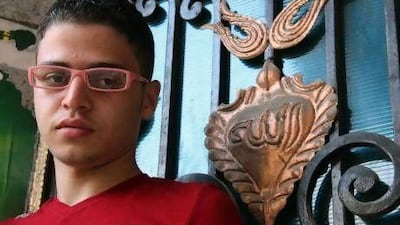It's hard to imagine this bespectacled, shy youth from rural Egypt as the fiery hip-hop artist Mc Dahab, whose complicated prose tackles military trials for civilians as adeptly as religious observance. That is, until he begins to rap.
Mahmoud Abueldahab's mastery of wordplay and brand of socially conservative Islamic hip-hop are quickly establishing him as a unique talent on the Arabic rap scene. Since posting his first track online seven months ago, Abueldahab has won over thousands of fans. "Hip-hop reaches into the mind and the heart very easily," says the 20-year-old student. "I want to implement the ideas of Sharia in my music, to create something meaningful that Muslims can listen to."
Born in Belbeis, a small town in the Nile Delta, Abueldahab says he finds inspiration in his daily conversations, and frustration at what he sees as the neglect of the people of Egypt. Like most small Nile Delta cities, Belbeis is crammed with three-storey apartment blocks and narrow, poorly paved roads. Under the president Hosni Mubarak's regime, many areas suffered from a lack of infrastructure and resources. Through his talent, Abueldahab is giving a new voice to Egypt's conservative, religious countryside.
The young orthodox Muslim believes in building the country through Islam. In the build-up to Egypt's first free presidential election, Abueldahab released the track Dress Yourself, venting his frustration about the fact that members of the old regime were allowed to run while the Salafist candidate Sheikh Hazem Salah Abu Ismail was disqualified because his mother held an American passport. In the song, Abueldahab says the only important aspect is that candidates protect citizens, as God asks.
His work is heavy with youthful optimism: he says he truly believes a state under an Islamist presidency will provide Egypt with an inclusive society that gives protection for all the "people of the book".
"God gave me the mind I think with and create music with, so whenever I create something I feel indebted to him," he says. "Every time I kneel to pray, I hope God will protect me in relaying my message in a song."
American hip-hop is heavily tied to Islam. Pioneering artists such as Afrika Bambaataa, RZA of the Wu-Tang Clan and Chuck D have long rapped about their religious influences. Mos Def has talked publicly about his faith as part of his creative process. Native Deen use only percussion because some orthodox interpretations of Islam believe that music itself is forbidden. (While there are many hadiths – sayings of the Prophet – that are in favour of music, there are others voicing disapproval of musical instruments.)
While some Muslim hip-hop artists use phrases of the Quran, Abueldahab says there is a clear line between writing about the teachings of the Quran and using its words. "We can't sing the Quran in songs because it's greater than us," he says. "It's forbidden to copy verses of the Quran into song."
An Islamic studies and translations major at Al Azhar University in Cairo, the country's leading religious institution, Abueldahab says he is acting on his faith to help guide others. As a conservative Muslim, Abueldahab tackles some difficult aspects of modern Muslim life, and also explores the interplay between religious and social values.
In a song titled The Muslim Sisters, the rapper addresses a loved one who he worries has lost her way spiritually and is insulting Islam by refusing to wear the veil. His lyrics evoke images of hellfire and street harassment. In it he raps: "If you think that make-up is something easy? / I will tell you God made it clear for you and all / You will tell me our religion is easy and I will tell you the veil is making this easier / Because when death comes it takes both young and old."
"When I get an idea, I check if it's going to be against our ethics or religion, and when I find the answer, I begin to write," he says, adding that he often consults with elders.
Indeed, the slender youth walks a delicate line between the simple, conservative values with which he was raised and the aggressive, fiery rhetoric often found in hip-hop. While many hip-hop artists in Egypt have adopted the baggy jeans and baseball caps typical of gangsta rap, Abueldahab's wide-rimmed pink glasses and skinny jeans make him look more at home in an art house cinema than a rap battle.
"I don't want to dress like a gangster. I'm not a gangster. I don't want to be one," he says. "Just because I am religious doesn't mean I can't be an artist as well."

